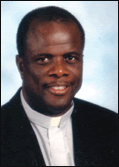
If liberty means anything at all,George Orwell wrote,it means the right to tell people what they do not want to hear.
A stoutly secularist thinker like Orwell and a devoutly Catholic priest like Rev. Paulinus Ikechukwu Odozor, associate professor of theology at the University of Notre Dame, could doubtless find many things to disagree about, but they would certainly be of one mind about this.
A specialist in moral theology, Father Odozor, who has taught at Notre Dame since 1999, has cheerfully engaged a wide variety of occasionally neuralgic issues with academic, ecclesial and political implications.Sex, marriage, violence and authority are all among the concerns of his chosen discipline, all of them susceptible to controversy, but Father Odozors recent work includes yet another.
The interplay between faith and culture, which theologians callinculturation,is a topic which suffuses and occasionally roils the religions and politics of Africa, and Father Odozor, a Nigerian by birth, has recently had some remarkable things to say about it.
In an essay appearing in the September issue ofTheological Studies,Father Odozor assesses the work of Rev. Benezet Bujo, a Congolese theologian who has attempted to develop and articulate a moral theology that is both authentically Christian and African.
In considering Father Bujos and similar projects, Father Odozor insists thatcultural criticism has to be an important ingredient in inculturation. Otherwise, the theologian runs the risk of succumbing to culturalism, an uncritical appreciation that can go so far as to insist that the gospel be judged by the culture, rather than the other way around.
Father Odozor observes thatAfrican theology has been calling attention to the fact that Christianity came into Africa in a Western cultural form that is not necessarily part of the gospel of Jesus Christ and that must be unmasked to allow the faith to become African in a way that would be more recognizable and acceptable to Africans.
Applauding this critical distance from the culture which colonized, exploited and despoiled the peoples and traditions of Africa, Father Odozor is, nevertheless far from uncritical of those Africancultural formswhich can sometimes thwart the planting and flourishing of the Christian gospel.His purpose is not, he says, to disparage butto advise caution and a more critical attitude to the facts of African history and culture.
As one arresting example of these, Father Odozor citespalaver,the communal and consensus-building conversation traditional in many African cultures, which Father Bujo has extolled as a wellspring of moral truth.
One concern I have is that Bujo has not given enough consideration to the elements of the demonic in the process of palaver,Father Odozor writes, recounting an incident he witnessed when he was a seminarian in a town in eastern Nigeria.
The town had been plagued by robberies and violence, and the town unionor basic democratic assemblyhad invited every male above 10 years old to take part in anIgba Ndu,or covenant ceremony.Each townsman was to vow that he had never stolen, would never steal, would not invite others to steal, would not assist others in theft, and would renounce violence and intimidation.
Before the ceremonies started,Father Odozor writes,various people from the town rose up to speak in the true spirit of palaver.All present had agreed upon the terms of the proposed oath when one wealthy and articulate townsman began to insist that nothing in the oath should prohibit townspeople fromdoing business.
According to Father Odozor,it was plainly understood by everyone present that doing businesshere meant cheating and stealing from other people who were not members of the clan.He writes that this tempting moral loophole, so intimidatingly proposed by the most powerful man in town,would have carried had not another man, known to be an upright and honest Christian, stood up to oppose him.It was only then that others had the audacity to speak up against this man.
This conviction that original sin afflicts whole cultures as well as individual people similarly animated an article Father Odozor wrote last July forThe Tablet,an English weekly Catholic magazine, in which he argued that Africas ancient cultures, as well its colonial legacy, have contributed to the continents conspicuous human misery.
One of the detestable aspects of European colonialism in Africa was the unfortunate assertion that Africans had no culture,Father Odozor wrote.However, in the attempt to correct one wrong Africans have sometimes gone to the other extreme in which African cultures and traditions are held to be sacrosanct.But I believe strongly that these very African cultures and traditions need to be examined critically in order to see what, if any, roles they play in the current African situation.
Praising traditional African societies for their rich hospitality and devotion to the vulnerable, Father Odozor suggested that this admirable generosity and care is too often restricted tosomeone who is either from ones own family, clan or ethnic group,and lamented the absence of an Africanculture of universal human rights in which equal humanity was granted to the other either on the basis of common sonship and daughtership in God or on a universal recognition of the persons humanity.
Father Odozors work is itself an increasingly noticeable contribution to the building of such a culture both in Africa and worldwide.It also usefully illustrates the ancient truth that ones truest friend is often ones most exacting critic.
_ Contact: Father Odozor at 574-631-6583 or_ " Paulinus.I.Odozor.1@nd.edu ":mailto:Paulinus.I.Odozor.1@nd.edu
TopicID: 29969